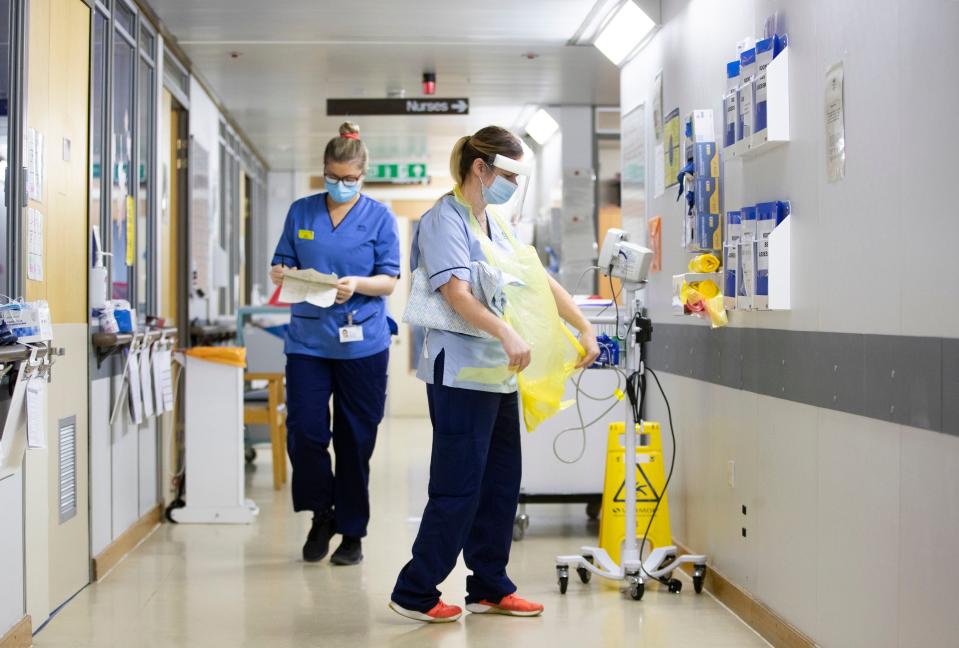All that clapping, it turns out, was simply the drum roll to a real-terms pay cut for NHS workers

Nurses working on Ward 5, a Covid red ward, at the Royal Alexandra Hospital in Paisley
(PA)When all this has passed, and it will, there will not be many moments of great national joy to look back upon, but there will certainly be at least one.
It happened at 8pm on Thursday 26 March, when very close to all of us went dutifully to our doorsteps or leant out of our windows to clap for the NHS, and suddenly got slapped about the face by the sound of the world clapping back.
There are thousands of viral videos of it all over social media, all different but all fundamentally the same. The whooping and cheering rolling over distant rooftops, the clatter of wooden spoons against overturned pans. The raucous sound of human life rushing in and sweeping loneliness aside. Watch them now and they feel like the moment of rescue in a disaster movie – the plane overhead, the lifeboat on the horizon.
They do not, it is fair to say, feel like what we now know them to be – the drum roll to a real-terms pay cut. Rishi Sunak’s most recent Budget (don’t worry, there will surely be another one along in the next couple of weeks) revealed a pay rise for NHS workers of one per cent. Set against the growing forecasts of rising inflation, this is less than pitiful.
As one mental health nurse pointed out on social media, the pay rise will amount to about £6 a week, significantly less than they spend on a day’s parking in the hospital where they work, which is, in itself, another outrage.
Since Wednesday’s Budget, the chancellor has been accused of “pork barrel politics”. Principally, of spending public money where there is most political gain to be had from it for the party of government. A new Treasury hub in Darlington, all sorts of other investments in Teesside, both of which happen to have recently voted Tory for the first time in decades.
The prime minister’s explanation was to say, in effect, “so what?” He has a huge majority. It would be hard, at present, to find areas in need of investment that didn’t vote Tory in 2019. Practically everywhere did. In some ways, it is politics functioning as it should. There is no moral principle against giving people a reason to vote for you.
Which is why the meagre NHS pay rise, in effect, a cut, is all the more mesmerising. A report in January indicated that as many as 850 UK healthcare workers died of Covid-19 between March and December last year. That is, for example, more than double the number of New York firefighters who lost their lives on 9/11.
It is hard to imagine, at any time, any cause behind which the people, en masse, are more united, and more happy to pay.
There are, naturally, some damning statistics to back it up. It’s not merely that Dominic Cummings’s little drive to Barnard Castle was not deemed sufficient to prevent him receiving a 40 per cent pay rise last year (though, for balance, we should include that he was also sacked). Nor is it even especially relevant that the money has been more than found for other causes. Test and trace may yet cost £37bn. Furlough is costing £4bn a month; PPE the same again.
The smallness of the number involved is the most startling factor. A one per cent pay rise for NHS workers costs around £500m. A three per cent rise would, of course, be three times that.
Can the government not see how gladly, and how much, the people wish for their money to be spent in that way? Almost a full tenth of that amount was raised, without the government’s help at all, by one 99-year-old man walking around his garden.
The level of public debate around public spending is always low, and always cakeist. There is not enough to go around, and almost all demands are worthwhile. But this particular example, in this particular year, is so manifestly, obviously, above and beyond debate.
Having clapped for NHS workers at every opportunity, we do not wish to be made fools of. It’s our money, it’s not very much and we want them to have it.
Read More
NHS pay rise: Nursing union sets up £35 million industrial action fund amid mounting anger
Hugh Laurie leads celebrity backlash to ‘pitiful’ 1% NHS pay rise: ‘This will not do’
British public urged to back mass slow handclap over 1% pay rise for NHS staff

 Yahoo Finance
Yahoo Finance 